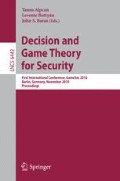Abstract
Penetration testing, the deliberate search for potential vulnerabilities in a system by using attack techniques, is a relevant tool of information security practitioners. This paper adds penetration testing to the realm of information security investment. Penetration testing is modeled as an information gathering option to reduce uncertainty in a discrete time, finite horizon, player-versus-nature, weakest-link security game. We prove that once started, it is optimal to continue penetration testing until a secure state is reached. Further analysis using a new metric for the return on penetration testing suggests that penetration testing almost always increases the per-dollar efficiency of security investment.
Access this chapter
Tax calculation will be finalised at checkout
Purchases are for personal use only
Preview
Unable to display preview. Download preview PDF.
References
Su, X.: An overview of economic approaches to information security management. Technical Report TR-CTIT-06-30, University of Twente (2006)
Böhme, R., Moore, T.W.: The iterated weakest link: A model of adaptive security investment. In: Workshop on the Economics of Information Security (WEIS), University College, London, UK (2009)
Böhme, R., Moore, T.W.: The iterated weakest link. IEEE Security & Privacy 8(1), 53–55 (2010)
Panjwani, S., Tan, S., Jarrin, K.M., Cukier, M.: An experimental evaluation to determine if port scans are precursors to an attack. In: Proc. of Int’l. Conf. on Dependable Systems and Networks (DSN 2005), Yokkohama, Japan (2005)
Gordon, L.A., Loeb, M.P., Lucysshyn, W.: Sharing information on computer systems security: An economic analysis. Journal of Accounting and Public Policy 22(6) (2003)
Gal-Or, E., Ghose, A.: The economic incentives for sharing security information. Information Systems Research 16(2), 186–208 (2005)
Gordon, L.A., Loeb, M.P.: The economics of information security investment. ACM Transactions on Information and System Security 5(4), 438–457 (2002)
Cavusoglu, H., Mishra, B., Raghunathan, S.: The value of intrusion detection systems in information technology security architecture. Information Systems Research 16(1), 28–46 (2005)
Barth, A., Rubinstein, B., Sundararajan, M., Mitchell, J., Song, D., Bartlett, P.L.: A learning-based approach to reactive security. In: Radu, S. (ed.) FC 2010. LNCS, vol. 6052, pp. 192–206. Springer, Heidelberg (2010)
Ogut, H., Cavusoglu, H., Raghunathan, S.: Intrusion detection policies for it security breaches. INFORMS Journal on Computing 20(1), 112–123 (2008)
Geer, D., Harthorne, J.: Penetration testing: A duet. In: Proc. of the 18th Annual Computer Security Applications Conference (ACSAC), Las Vegas, NV, USA (2002)
Arkin, B., Stender, S., McGraw, G.: Software penetration testing. IEEE Security & Privacy 3(1), 84–87 (2005)
Richardson, R.: CSI Computer Crime and Security Survey. Computer Security Institute (2007)
Miura-Ko, R.A., Bambos, N.: SecureRank: A risk-based vulnerability management scheme for computing infrastructures. In: IEEE International Conference on Communications (Proc. of ICC), pp. 1455–1460 (2007)
Böhme, R., Nowey, T.: Economic security metrics. In: Eusgeld, I., Freiling, F.C., Reussner, R. (eds.) Dependability Metrics. LNCS, vol. 4909, pp. 176–187. Springer, Heidelberg (2008)
Purser, S.A.: Improving the ROI of the security management process. Computers & Security 23, 542–546 (2004)
Kanich, C., Kreibich, C., Levchenko, K., Enright, B., Voelker, G., Paxson, V., Savage, S.: Spamalytics: An empirical analysis of spam marketing conversion. In: Conference on Computer and Communications Security (Proc. of ACM CCS), Alexandria, Virginia, pp. 3–14 (2008)
Author information
Authors and Affiliations
Editor information
Editors and Affiliations
Rights and permissions
Copyright information
© 2010 Springer-Verlag Berlin Heidelberg
About this paper
Cite this paper
Böhme, R., Félegyházi, M. (2010). Optimal Information Security Investment with Penetration Testing. In: Alpcan, T., Buttyán, L., Baras, J.S. (eds) Decision and Game Theory for Security. GameSec 2010. Lecture Notes in Computer Science, vol 6442. Springer, Berlin, Heidelberg. https://doi.org/10.1007/978-3-642-17197-0_2
Download citation
DOI: https://doi.org/10.1007/978-3-642-17197-0_2
Publisher Name: Springer, Berlin, Heidelberg
Print ISBN: 978-3-642-17196-3
Online ISBN: 978-3-642-17197-0
eBook Packages: Computer ScienceComputer Science (R0)

